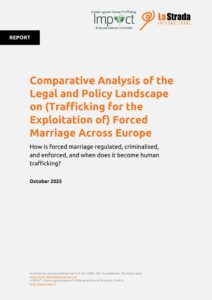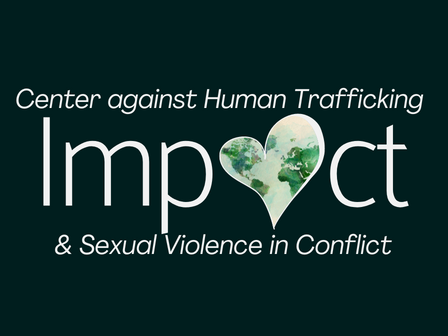Events
Publication: The Legal and Policy Landscape on (Trafficking for the Exploitation of) Forced Marriage Across Europe
After pre-launching the report during a webinar on 17 October, we today publish our comparative analysis on (Trafficking for the Exploitation of) Forced Marriage across Europe. Following the new obligations for EU Member States to criminalise forced marriage and the exploitation of forced marriage as a form of human trafficking, according to the amended EU Anti-Trafficking Directive and the EU Violence Against Women and Domestic Violence Directive, Impact and La Strada International conducted research, with great support of Zsófia Bagó, to examine how forced marriage is legally defined and understood in relation to human trafficking. Next to analysing how it is regulated and criminalised across Europe, we also reviewed the obligations that arise from the new EU legal frameworks.
This comparative study covers 38 European countries, including all 27 EUMS. For each country, we mapped how forced marriage is regulated, criminalised, and enforced, and under which conditions its exploitation might become human trafficking. For this, we also analysed existing case law.

Key Findings
- Most European countries already criminalise forced marriage, though the scope and legal framing vary. A small number also classify it as exploitation under human trafficking laws, and only Croatia, Iceland, Spain, and Ukraine recognise it under both frameworks.
- Despite legislation, prosecutions are rare and often pursued under broader offences, such as coercion or domestic violence, due to limited investigations, lack of evidence, and victims’ reluctance – often linked to family involvement.
- Data collection is weak, leaving no reliable comparative statistics.
- Forced marriage is not universally considered a form of human trafficking, and cultural or traditional justifications often obscure the issue.
- Overall, legal and non-legislative measures remain insufficient, and the effective prosecution and prevention of forced marriages across Europe remains highly challenging.
Recommendations
- Strengthen Legislation and Ensure Comprehensive Criminalisation, both as a stand-alone offence and as a form of exploitation within human trafficking legislation.
- Investigate and Prosecute Trafficking-Related Cases Proactively, including specialised investigation, proportionate penalties, victim-centred procedures.
- Clarify and Harmonise the Concept of “Exploitation”, as countries still differ in assessing whether and when a forced marriage constitutes exploitation.
- Strengthen Training and Cooperation on how to address Forced Marriage Cases.
- Guarantee Victim Protection, Support, and Access to Justice, and ensure that legal procedures prioritise their safety and dignity.
- Set the Legal Minimum Age for Marriage at 18.
- Broaden the Definition of Forced Marriage to include other forms of unions that are comparable in nature and function to marriage, even if not legally valid.
- Enable Unrestricted Annulment of Coerced Marriages. Countries still differ in assessing whether and when a forced marriage constitutes exploitation.
- Complement Legal Reforms with Non-Legislative Measures, including awareness-raising, school programmes, professional training, and targeted national action plans.
- Ensure Systematic Monitoring and Data Collection, collected annually, publicly accessible, and including victim demographics, relationships to perpetrators, and case outcomes.
IMPACT ICC ASP Side Event (4 December 2024)
IMPACT, the Kingdom of Belgium, and the UN Team of Experts on the Rule of Law and Sexual Violence in Conflict organized a side event during the ICC’s Assembly of State Parties on recent efforts to deepen our understanding of the interplay between the different legal regimes, and their ability to address the true criminality of crimes which sit at the intersection of sexual violence in conflict, trafficking in persons, and/or slavery and the slave trade, from both the international and national perspective. Several experts have touched upon this issue in recent or forthcoming publications, namely the 2024 Special Issue of the Journal of Human Trafficking, Enslavement and Conflict-Related Sexual Violence (JHEC), and the forthcoming report of the UN Team of Experts on the nexus between CRSV and human trafficking for sexual exploitation, with a focus on Ukraine and the ICC Policy on Slavery Crimes.

